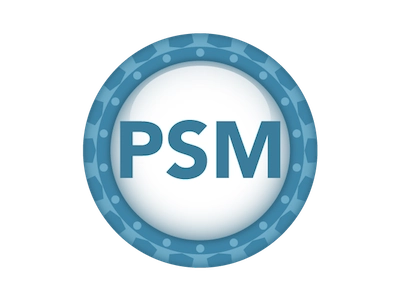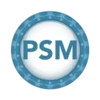Professional Scrum Master™ I (PSM I)
Within the framework of Scrum, an agile approach for managing and executing complex projects, there is a position known as Professional Scrum Master. In order to facilitate the Scrum process and make sure the Scrum Team follows Scrum practices and principles, the Scrum Master is essential.
Overview
The standard entry-level certification known as Professional ScrumMaster I (PSM I) attempts to impart comprehensive knowledge about Scrum and the role that Scrum masters play in it. Gaining greater job options and validating one’s understanding of the Scrum framework in the workplace are possible with the PSM 1 certification. A foundational level of Scrum mastery, including the principles of applying Scrum, and a demonstration of a grasp of Scrum as outlined in the Scrum Guide are required of those who obtain the internationally renowned Professional Scrum Master I (PSM I) certification. Additionally, this person has shown a consistent commitment to Scrum and usage of terminology.
What you will learn in Professional Scrum Master™ I (PSM I) course?
- The Scrum Framework
- The Definition of Done
- Running a Scrum Project
- Working With People and Teams
- Scrum in Your Organization
- The Role of the Scrum Master
Who Should Attend Implementing Professional Scrum Master™ I (PSM I) course?
- Scrum Masters
- Product Owners
- Product Managers
- Scrum Team Members
- Business Analysts
- Developers
Our Package
- Scrum Events: Every event in Scrum is an inspect and adapt opportunity. How are these events important? What are the impacts of missing one of these?
- Scrum Role: Every role in Scrum has specific accountabilities. What are their accountabilities? Why are they important? How are they different to traditional project management roles?
- Scrum artefacts: Every artifact in Scrum is transparent so organisation can inspect and adapt based on it. Why are these artefacts important?
- Sprint: The Sprint is the heartbeat of the Scrum framework. What is a Sprint? What are the criteria of a successful Sprint?
- How is empirical approach different to defined approach?
- What makes Scrum different to traditional project management approach?
- What is Agile?
- How does Agile relate to Scrum?
- Why should we be Agile and use Scrum?
- In what case is Scrum not suitable?
- Product Backlog and Sprint Backlog: The Product Backlog and Sprint Backlog is the plan in Scrum. How is planning in Scrum different traditional project management? What is the best practice to do Lean Planning in Scrum? How to do Product Backlog Refinement?
- Product Backlog Management: Product Backlog reflects the roadmap of the Product. How do we do Product Backlog management in Scrum?
- Product Backlog Ordering: Prioritization is one way to order Product Backlog. What are the other techniques to order the Product Backlog?
- Product Backlog Decomposition: Product Backlog is decomposed so that it can be done in one Sprint. How do we decompose Product Backlog to ready to execute Sprint Backlog?
- Definition of Done: Everyone in the organisation should have the same understanding about “DONE”. What is “DONE”? What is the impact of not having “DONE” software every Sprint?
- Quality: What is required for a high-quality software? Does Scrum need documentation?
- Creating self-organizing teams
- Coaching Techniques
- Facilitation Techniques
- This course put emphasizes on one of the roles in Scrum – the Scrum Master.
- Scrum Masters are servant-leaders with distinct skills.
- Certification Prerequisites
- Certification Exam
Upcoming Batch
April 20th (Weekends)
FRI & SAT (4 Weeks)
08:30 PM to 01:00 AM (CDT)
April 18th (Weekdays)
MON – FRI (18 Days)
10:00 AM to 12:00 PM (CDT)
Professional Scrum Master™ I (PSM I) FAQs
The benefits of undertaking a Professional Scrum Master course and earning a certification opens up several new doors and opportunities for a professional.
Some of the most significant ones are as mentioned below:
- Earn the status of an industry-recognized Professional Scrum Master
- Get recognition throughout the industry
- Gain the ability to take on projects which require knowledge of SCRUM management.
- The ability to market their skills and thus negotiate better benefits at the current workplace or new ones
Not necessarily. Each course has attendees from a variety of backgrounds, including from non-software fields. The instructor will cover product development of all sorts, so many examples are software related, but no software development experience is required.
There are no fixed set of people to be eligible for Professional Scrum Master certification. PSM course is suitable for anyone who wants to enhance or deepen their knowledge of the Scrum framework and its applications.
Like every other job, if you want to become a Scrum Master, you need to take specialization. When you have a PSM certification, it will demonstrate your ability and your knowledge of Scrum and how to apply it in real-world situations.
Once a candidate has undertaken the Professional Scrum Master™ course and earned their certification, their career will take a turn for the better.
Apart from being a mentor to other teams and companies, mentioned below are some of the other career options open to a certified Professional Scrum Master™.
- Certified Scrummaster® (CSM®)
- Information Technology (IT) Consultant
- Senior Software Engineer
- Senior Business Analyst
- Systems Analyst
- Project Manager, Information Technology (IT)
Software Requirements
- Internet browser
- MS Word or Notepad
System Requirements
- Windows or equivalent environment with Internet browser and high-speed Internet connectivity








Reviews
There are no reviews yet.